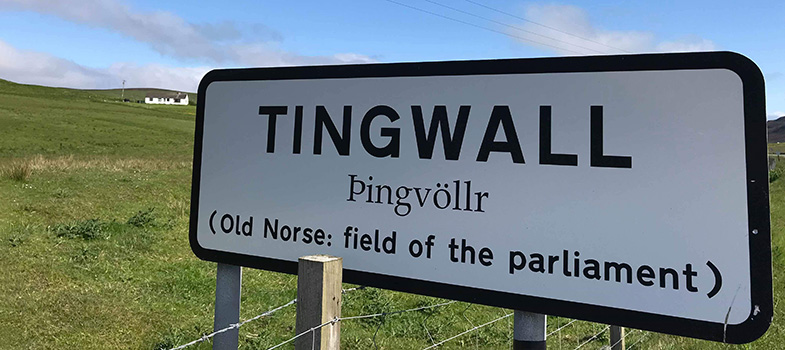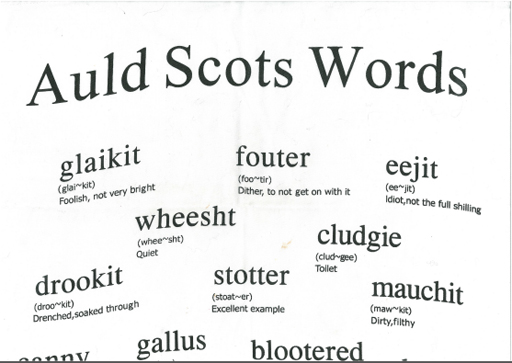2.2 Older Scots vocabulary
This section will draw your attention to the fact that Scots is a living language, with much of its vocabulary, though historic in nature, still in wide use today.
“Scots has been fragmented as a language and, with the dearth of broadcasting in the remaining dialects, very few people have first-hand experience of the spectrum of Scots which is spoken across the country”
A consequence of the ‘fragmentation’ of Scots, mentioned by Billy Kay, is a general tendency to celebrate Scots at a vocabulary level only. Our media regularly runs polls of ‘favourite Scots words’. This is something which everyone can buy into – speakers and non-speakers alike all have a favourite, whatever their position on the use, learning and teaching of the language.
This gives rise to items, such as dishcloths, being offered to tourists and natives alike labelled ‘Auld Scots Words’. In reality, many of the words given and defined on such merchandise are in common, every-day usage, in many parts of the country.
In relation to the use or disuse of particular Scots words Billy Kay explains: “Coming from a fairly strong Scots-speaking area, I presumed that if a word was not used in my own dialect, it would also have become obsolete elsewhere”. If an authority like Kay can make such a presumption, it is perhaps easy to understand others making a similar error.
Scots is still being spoken, its vocabulary being used. The 2011 census identified about 30% of respondents with some skills in Scots. Perhaps surprisingly, for those who see Scots as ‘the language their granny used’, 34.2% of 15-year-olds were reported to have some skills, a figure which rises steadily throughout the age groups to 43.4% of 60 to 64-year-olds, before falling to 36.3% of those aged 85 years and older. Here is a PDF version [Tip: hold Ctrl and click a link to open it in a new tab. (Hide tip)] of the report.
These figures do not support some of the views of Scots reported by the Registrar General for Scotland Scotland’s Census 2011 Release 2A (p. 18), which states a certain lack of understanding of what Scots is.
This lack is illustrated in quotes like these:
“Scots is only what I would consider to be English with a Scottish accent….”
“I wouldn’t know where to put the difference between Scottish dialects of English and Scots.”
“…Who do I consider to speak Scots? Well probably somebody from about 250 years ago.”
On the other hand, the census suggests that large numbers of young, living Scots believe they have some proficiency in the language, which is proof of Scots as a living language in today’s Scotland.
Activity 6 
Tuning into spoken Scots
Listen to a short extract from Scots Radio to hear some Scots being used in context. Each podcast includes a range of musical items as well as interviews and discussions.
- a.Start with the first podcast of 2019 and listen to a section of speech. This is a way of ‘tuning into’ spoken Scots. Try to identify:
- i.words you know
- ii.words that sound familiar
- iii.words you might recognise from having studied this course.
- b.To help you understand the podcast, also read the summary of the topics covered underneath the audio recording on the same page.
You might want to note down any vocabulary you want to ‘take away’ to add to your own Scots glossary.
If you want to find out more and maybe train your ear to listen to spoken Scots, there are more episodes on Scots Radio.
2.1 Finding and sharing vocabulary

